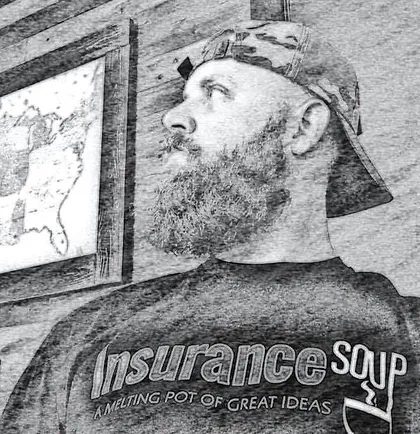The Hidden Lane in Insurance: Why Owning a Niche Changes Everything
Most agents play in the same sandbox. Auto. Home. Maybe a little small commercial. A lot of the same marketing, same pitches, same clients, same frustrations.
It’s comfortable. Predictable. But it’s also crowded—so crowded that you start sounding just like everyone else, whether you mean to or not.
But when you specialize—when you carve out a niche in the commercial space—the whole game changes. Suddenly, you’re not competing with 50 other agents. You’re competing with maybe two who even understand what you’re talking about.
And that’s where real growth starts.
Why Picking a Lane Makes You Dangerous
Every agent says they can “write anything.” And that’s the problem—if you’re everything, you’re nothing specific...or special.. no matter what momma tells you.
Business owners don’t want generalists anymore. They want people who understand their world—their regulations, their exposures, their headaches.
When you specialize in a niche—say contractors, landscapers, non-profits, solar companies, trucking, restaurants, or even dental offices—you stop selling insurance and start selling expertise... and while anyone with a license has insurance to sell.. you become one of the elites that lead with the true value of expertise.
Because you can talk to them like one of them. You understand their pain points. You can identify coverages they’ve been misadvised on. You speak their language.
That’s what gets a business owner to listen. That’s what gets them to trust you.
And trust is the currency that leads to everything else—referrals, renewals, personal lines, life, and health business from their staff.
You’re not chasing accounts. You’re building a lane.
How to Build Authority in Your Niche
Becoming a specialist doesn’t mean announcing on your website that you are one. It means showing it—over and over.
You earn authority by:
Hanging out where your niche hangs out.
Reading what they read.
Joining their associations.
Talking publicly about their industry issues, not yours.
Going to their conferences
Hell maybe you even own a community of them on social media kinda like how we hang out with all of you in Insurance Soup on Facebook!
Post tips. Create short educational videos. Share insights on compliance, loss control, or regulation changes.
You’ll know you’re starting to break through when your content starts getting shared inside those circles. That’s when you go from “some insurance guy” to “the one who gets it.”
Once they trust your expertise, quoting becomes easy. But before you quote anything, you need to control the account.
The BOR-First Mindset: Stop Working for Free
Every agent who’s been around long enough has had this happen:
You spend hours reviewing policies, pulling loss runs, quoting, finding gaps, crafting recommendations—and after all that, the client says,
“Thanks for the info. I’m going to show this to my current agent and see if they can match it.”
Translation: You just did their agent’s job for them. For free.
That’s why experienced producers BOR first, quote later.
The Broker of Record (BOR) letter is what makes you the official agent of record on the account. It transfers representation of that policy to your agency, giving you control over the carrier relationship, the servicing, and the future strategy.
Without it, you’re a bystander.
With it, you’re the broker.
You’re no longer asking for a chance—you’re being hired.
How to Ask for the BOR (And Get It)
Here’s the thing: asking for the BOR isn’t pushy. It’s professional. It’s how you protect the client and yourself.
But the key is in how you ask.
Once you’ve done your discovery and shown that you understand the business better than their current agent, it’s time to shift the conversation. Don’t make it about “taking the account.” Make it about improving how they’re being represented.
Here’s how you frame it:
“Look, I’m not here to take shots at whoever’s managing your account. But based on what I’ve reviewed, there are some real opportunities to improve how you’re protected and how your coverage is structured. I can’t fix any of that from the outside.
The easiest way to move forward—without disrupting your coverage or starting over—is to sign a simple letter that transfers your policy representation to me as your broker. You are with a solid carrier it just seems like you are either unhappy with, dont know, or dont trust your current broker. It doesn’t cost you anything, it doesn’t change your carrier, and it lets me go in and make the improvements we talked about.
I can’t promise we’ll always be the cheapest, but I can promise you’ll have someone who understands your business, advocates for you properly, and puts your protection ahead of everything else.”
This approach works because it:
Positions the BOR as a continuation of their coverage, not a disruption.
Makes it about representation, not price.
Reinforces trust as the reason for the move.
If you’ve done your job right in discovery—if you’ve found errors, gaps, or inefficiencies—this ask feels natural. It’s not a hard sell. It’s a logical next step.
You’re not saying “Fire your agent.” You’re saying “Let me represent you better.”
Why the BOR Makes Sense—Even if You’re Not Cheaper
Here’s where most agents blow it. They assume they need to beat the incumbent on price to win the BOR. You don’t.
In fact, leading with price often kills your credibility. It puts you back in the “just another agent” box.
The truth is, business owners don’t want the cheapest insurance—they want the best representation.
When you BOR the account, you’re giving them:
A broker who actually knows their industry.
A relationship where communication is proactive, not reactive.
A chance to fix mistakes without restarting the underwriting process.
Consistency with the same carrier and policy number—no downtime, no rework.
A trusted advisor who aligns the coverage with their operations, not just the quote sheet.
That’s worth more than saving 5%.
And once they understand that—once you make them feel understood, protected, and prioritized—the BOR becomes the obvious move.
The Secret Sequence: Owner → BOR → Staff → Cross-Sell
Every commercial niche strategy follows this sequence:
Win the owner. Get the BOR. Earn the staff. Cross-sell everything else.
Your first mission is to earn the owner’s trust. That’s the gatekeeper to everything.
Ask the questions no one else does:
What keeps you up at night about your business?
How do you make decisions around risk or safety?
What’s the worst experience you’ve ever had with insurance?
These questions uncover pain and create openings. Once you’ve earned their trust, and they sign the BOR, that’s when you start fixing their coverage.
When the owner sees you take action—cleaning up their policies, advocating for better terms, improving risk management—they become your biggest advocate.
And that’s when they say:
“You should probably talk to my team too. They all have their own stuff going on—auto, home, life, health. Maybe you can help them too.”
(and if they dont say this... its time to suggest it - its another feather for the business owner to stick in their cap as its just ANOTHER set of benefits theyre providing their people!)
That’s how a single commercial account turns into 30 new policies.
But you can’t shortcut it. You can’t walk in pitching auto and life to employees of a company you don’t represent. The key that unlocks all of it is trust—and that trust starts with the owner.
Systemizing the Niche
Once you’ve got your first few wins in a niche, it’s time to make it repeatable.
Build a process around your success:
Document the pain points that keep showing up.
Refine your discovery questions.
Create a playbook of how you earned each BOR.
Develop marketing content that speaks directly to that audience.
May I make a humble suggestion that you can even expedite all this knowledge with a long conversation with chatgpt or another AI model.
Soon, you’ll have an entire strategy built around that niche—complete with testimonials, results, and reputation.
That’s when it gets fun. Because suddenly, the niche starts chasing you.
Marketing Where Nobody Else Is
Here’s the other beauty of niches: they’re wildly under-marketed.
Everyone is running Facebook ads for home and auto.
Nobody’s talking about how to insure mobile pet groomers with five vans and three part-time employees.
Everyone’s posting about “saving money.”
Nobody’s producing short-form videos about the importance of employee dishonesty coverage for retail businesses.
When you specialize, your marketing gets sharper—and more relevant. You’re no longer shouting into the void. You’re speaking directly to people who feel like,
“This guy gets me.”
That’s how you go from cold calls to inbound calls.
Never Stop Learning Your Lane
Once you’ve established yourself in a niche, your job isn’t done—it’s just starting.
Stay sharp. Keep learning the regulations, loss trends, and risk patterns that affect your industry. Join trade groups. Sponsor events. Speak on panels.
The more immersed you are, the less you’ll ever need to “sell.” Because you’ll be known.
And being known in a niche is the insurance equivalent of a monopoly.
The Real Payoff
At the end of the day, success in insurance isn’t about being broad—it’s about being deep.
When you go deep in one industry, you don’t just write policies. You become the name people in that space trust.
That leads to:
Long-term relationships.
Consistent renewals.
Referrals from inside the niche.
Cross-sells into personal, life, and health lines.
And it all starts with earning one owner’s trust enough to sign one BOR.
Do that over and over, and you’ll build a book that’s stable, respected, and impossible to replace.
.png?width=180&height=65&name=Untitled%20design%20(29).png)



